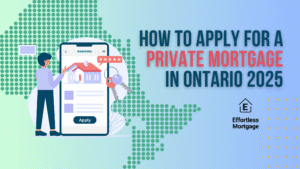Short answer: In Ontario, private mortgages are short-term solutions focused on home equity (LTV) more than credit. Typical caps are ~75–80% LTV for 1st mortgages and lower for 2nds. Expect fast approvals (often 2–3 days), flexible docs, and higher rates/fees than banks. Best fits: bank declines, urgent timelines, self-employed income, or unique properties. Always plan an exit back to A/B lenders within 12–24 months.
What drives your rate: property, location, LTV, credit, and the strength of your exit plan.
Next step: A broker can compare private options across multiple lenders and structure your refinance/exit strategy.
Private lenders in Ontario (as well as in other provinces) are becoming a popular choice in 2025 for homeowners who need mortgage solutions beyond traditional banks. If you’re trying to buy a home or refinance in Ontario but feel held back by strict bank rules, you’re not alone. More people are turning to private mortgage lenders for faster approvals and flexible options, especially when conventional lenders say no. Here’s what you need to know if you’re considering the private lending path.
Why Choose a Private Mortgage Lender in Ontario?
Traditional mortgage approval isn’t realistic for everyone. If you’re self-employed, have bruised credit, need funding quickly, or simply don’t meet a big bank’s definition of “ideal borrower,” private mortgage lenders in Ontario offer an essential alternative.
In 2025, with housing costs soaring and lending rules staying strict, these lenders are more relevant than ever.
Private lenders are individuals or companies that finance mortgages outside the traditional banking system. They look primarily at the equity in your property rather than your credit score or income history, making them a solution for:
- Homeowners denied by banks
- Those needing urgent financing (e.g., to stop a power of sale)
- Borrowers with inconsistent or alternative income
- People consolidating debt or refinancing
Top Private Mortgage Lender Rates in Ontario (as at August 2025)
Finding licensed private lenders Ontario residents can trust is important. Here’s a list of top private mortgage lenders in Ontario along with their current private mortgage rates. Bear in mind that private mortgages are typically higher than those from banks, reflecting the greater risk to the lenders. Here’s what you should expect in 2025:
| Private Lender | Term | Interest Rate Starting From | Lender Fee Starting From | Loan-to-Value |
|---|---|---|---|---|
| Readi Financial | 1 yr | 5.99% | 2.00% | 80% |
| Atrium MIC | 1 yr | 7.19% | 2.00% | 80% |
| Vault Mortgage Corporation | 1 yr | 6.49% | 2.00% | 75% |
| Brightpath Capital | 1 yr | 7.49% | 2.00% | 80% |
| Greenlight Capital | 1 yr | 7.99% | 2.00% | 80% |
| AltaWest MIC | 1 yr | 5.99% | 2.00% | 75% |
| Magenta MIC | 1 yr | 5.99% | 2.00% | 80% |
| Sequence Capital | 1 yr | 5.99% | 2.00% | 75% |
| OZ Capital | 1 yr | 7.49% | 2.50% | 75% |
| Canadian Mortgage Inc. (CMI) | 1 yr | 7.99% | 3.00% | 80% |
- General range for private 1st mortgages: 5.99% to 7.99%
- Range for private 2nd mortgages: 6.99% to 14%
-
Actual rates depend on property type, location, credit, loan-to-value (LTV), and more.
How Do Private Mortgages Work in Ontario?
Private mortgages can be for first, second, or even third position on a property. These loans are almost always short-term (1–2 years) and used as bridge solutions.
Key Features
- Fast Approvals: Many private lenders approve in under 2–3 days if you have sufficient equity or down payment.
- Flexible Criteria: Approval is mainly based on your home equity—less on your credit or income.
- Short Terms: Typical term is 12-24 months, giving you time to repair credit, stabilize finances, or refinance with an A or B Lender.
- Interest-Only Payments: Many arrangements allow for interest-only payments, lowering your monthly outlay but delaying principal repayment.

When Is a Private Lender the Right Choice?
- Bank denial due to credit, income, or property type
- Urgent financing required (purchase, stop sale, bridge loan, etc.)
- Debt consolidation at lower overall cost
- Unique properties or self-employed, commission-based borrowers
Note: Private lending isn’t meant for permanent financing; the goal is often to transition to a traditional lender as soon as possible.
Pros and Cons of Private Lenders
Private mortgages can be for first, second, or even third position on a property. These loans are almost always short-term (1–2 years) and used as bridge solutions.
Pros
- Quick, flexible approvals
- Less paperwork than banks
- Tailored solutions (including interest-only or payment-delayed structures)
- Suitable for urgent, unconventional, or complex situations
Cons
- Higher interest rates (reflecting higher risk to lenders)
- More fees (setup costs, lender/broker fees)
- Short-term “bridge” focus—can be costly if kept long-term
- Need for exit strategy (e.g., plan to refinance)
How to Get the Best Private Mortgage Rates
- Work With a Broker: Mortgage brokers like Effortless Mortgage, with experience in private lending have established connections with top private lenders. They can shop around on your behalf to find competitive rates tailored to your financial situation and negotiate terms that traditional borrowers may not access.
- Leverage Equity: The more home equity you have, the better your approval odds and rate because it offers lower risk for lenders. Keep your equity documentation clear and up to date.
- Prepare Documentation: Private lenders need to assess risk quickly and accurately. Be prepared with a detailed information on your property information, current equity proof, income verification (even if non-traditional), and most importantly, a clear exit strategy. This plan should explain how you intend to repay the loan or refinance to a bank mortgage — which a mortgage broker can help you with.
- Choose the Right Term: Private mortgages are usually short term (1 to 2 years). Picking the right term involves balancing your timeline to secure permanent financing against costs such as prepayment penalties or renewal fees. Discuss term options with your broker to align with your financial goals and avoid unexpected expenses.
- Consider Credit Improvement: While private lenders are more flexible, improving your credit prior to application can still positively impact your rate offers. Address derogatory marks early and keep debts manageable to strengthen your position. Head over to our blog on “Five Steps to Boost Your Credit Score Fast” for more info!
Now that you know about the recent policy changes and have an idea of the current rates, here are some actionable steps to help you secure the best mortgage renewal deal:
Frequently Asked Questions (FAQ)
Q: What is a private lender in Ontario?
A: A private lender in Ontario is an individual or company that provides mortgage loans outside of traditional banks and credit unions. They often offer faster approvals and more flexible criteria, making them a good option for those who don’t qualify for conventional mortgages.
Q: How do private mortgage rates in Ontario compare to traditional rates?
A: Private mortgage rates in Ontario are typically higher than traditional mortgage rates because private lenders take on more risk. Rates vary based on loan-to-value ratios and borrower profiles but usually range from around 7% to 13%.
Q: When should you consider a private mortgage?
A: Consider a private mortgage if you’ve been declined by traditional lenders, need quick financing, have non-traditional income, or own a unique property that banks won’t finance. Private lending can also help with short-term needs like bridging or debt consolidation.
Q: How can I get better private mortgage rates in Ontario?
A: Work with an experienced mortgage broker, leverage your home equity, prepare thorough documentation, choose the right mortgage term, and maintain good communication with lenders to secure better private mortgage rates.
Q: Are private lenders in Ontario regulated?
A: Yes, private lenders in Ontario must be licensed and regulated by the Financial Services Regulatory Authority of Ontario (FSRA). This ensures they follow rules that protect borrowers.
Q: What are the risks of using a private mortgage?
A: Private mortgages often have higher interest rates and shorter terms, which can make repayment challenging. It’s important to watch for hidden fees and avoid predatory lenders by researching thoroughly.
Final Thoughts: Is Private Lending Right For You?
Private mortgage lenders provide vital solutions for Ontario homeowners who don’t qualify under traditional lending guidelines. The higher rates reflect greater flexibility, speed, and access to funds when you need them most—but it’s crucial to have a plan to transition back to traditional lending.
If you’re considering a private mortgage in Ontario, speak with the Effortless Mortgage team for transparent advice and fast approval support.
Ready to Explore Your Options?
Contact Effortless Mortgage today to get connected with trusted private lenders Ontario homeowners rely on.
We have VIP relationships with over 90+ banks, b lenders and private mortgage lenders including our own in-house private lender with $0 broker fee.










